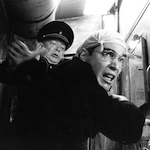 “But I haven’t done anything. I’m not working for either side.”
“But I haven’t done anything. I’m not working for either side.”
“Exactly.”
It was May 22nd. The day Ripley died in ALIEN 3. The day they found ENCINO MAN. The day FAR AND AWAY came out but I can’t review everything man, I’m already way behind on this summer series. The day of Johnny Carson’s last Tonight Show. Also it was the day Miramax released ZENTROPA in North America, according to various sources.
 But I found a poster that says May 5th (maybe for video?) and Roger Ebert’s reviewed of it is dated July 3rd. I guess the relevant thing here is that, like other limited releases such as DELICATESSEN and ONE FALSE MOVE, it was playing various theaters at various points during the summer. That’s how it worked back then.
But I found a poster that says May 5th (maybe for video?) and Roger Ebert’s reviewed of it is dated July 3rd. I guess the relevant thing here is that, like other limited releases such as DELICATESSEN and ONE FALSE MOVE, it was playing various theaters at various points during the summer. That’s how it worked back then.
ZENTROPA is really called EUROPA – that’s the original title and what it’s now called on video (like THE PLAYER and NIGHT ON EARTH this has a Criterion Edition). But the North American theatrical release was retitled ZENTROPA for the honestly reasonable purpose of avoiding confusion with Agnieszka Holland’s EUROPA EUROPA. I distinctly remember going to see NIGHT ON EARTH and seeing a literally hypnotic trailer that I think was probly the same as the one I’ve found on Youtube except it was “LARS VON TRIER – ZENTROPA” that kept appearing on screen instead of LARS VON TRIER – EUROPA.” So for historical accuracy I’m labelling this review ZENTROPA.
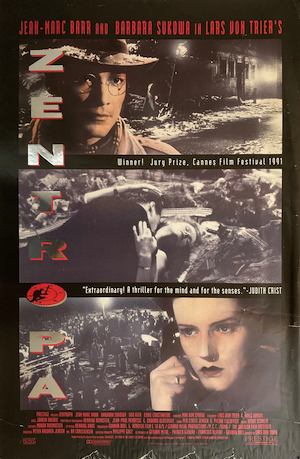 This was the fifth theatrical feature from Danish writer/director von Trier, following THE ORCHID GARDENER (1977), IMAGES OF LIBERATION (1982), THE ELEMENT OF CRIME (1984) and EPIDEMIC (1987), and it’s considered to be part of a “Europa Trilogy” with the latter two. (They’re only connected thematically and in that they sometimes start with ‘E.’)
This was the fifth theatrical feature from Danish writer/director von Trier, following THE ORCHID GARDENER (1977), IMAGES OF LIBERATION (1982), THE ELEMENT OF CRIME (1984) and EPIDEMIC (1987), and it’s considered to be part of a “Europa Trilogy” with the latter two. (They’re only connected thematically and in that they sometimes start with ‘E.’)
Frankly I’m ignorant of von Trier’s work, having only seen DANCER IN THE DARK (which I respected/mostly liked at the time) and ANTICHRIST (which I thought was mostly ridiculous). These days he’s mainly known as the asshole who sexually harassed Bjork, so it’s hard to get enthusiastic about catching up on the other ones, but I’m glad I watched this one, because I really did like it.
It’s the story of a naive young American dork named Leopold Kessler (Jean-Marc Barr, THE BIG BLUE) who moves to Germany right after WWII and gets hooked up for a job working with his German uncle (Ernst-Hugo Alfred Järegård, who would soon play Carl Jung on The Young Indiana Jones Chronicles) as a sleeping car conductor for the Zentropa railway company. While still learning the job he’s called in to assist/be hit on by a passenger named Katharina Hartmann (Barbara Sukowa, ROSA LUXEMBURG), whose family founded Zentropa in 1912. She invites Leo to a family dinner, so he meets her father/head of Zentropa Max (Jørgen Reenberg) her cynical brother Larry (Udo Kier in his followup to MY OWN PRIVATE IDAHO), and their priest (Erik Mørk,THE WITCH HUNT).
Everyone thinks it’s weird that an American would come here now, but Leo has this idealistic notion that it’s important to “show kindness” after everything people have been through there. The company likes having him as a conductor, thinking it will appeal to the American military officers who are now major clients. In fact, an American colonel named Harris (Eddie Constantine, ALPHAVILLE, IT LIVES AGAIN) asks him to be sort of a spy looking out for the pro-Nazi saboteurs and assassins called werewolves. (He tries to give Leo a gun but he says, “If I wanted to carry a weapon I would have come here earlier.”)
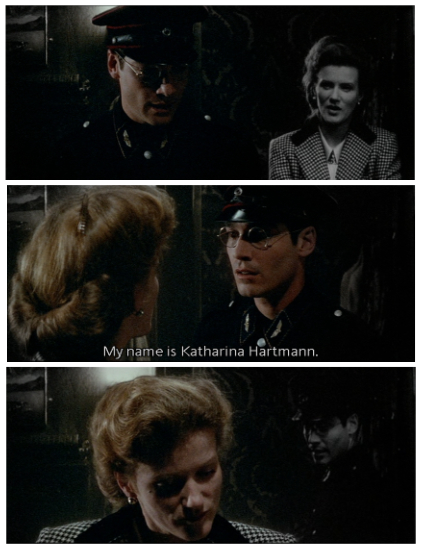 Wikipedia claims that “The film’s characters, music, dialogue, and plot are self-consciously melodramatic and ironically imitative of film noir conventions,” but if so I sure didn’t get it. I took it as a sincere old-timey movie, and a good one. It has a beautiful black-and-white look, with occasional cryptic uses of color. I noticed the color shots here and there and wondered what their meaning was, and then in the scene where Leo meets Kat there’s a shot where he’s in color and she’s black and white, then she steps around him and becomes color, then he steps off screen for a second and comes back black and white. It’s easy to figure out how many of these cool shots are accomplished with rear projection (reminds me of ARMY OF DARKNESS) but that makes them fun.
Wikipedia claims that “The film’s characters, music, dialogue, and plot are self-consciously melodramatic and ironically imitative of film noir conventions,” but if so I sure didn’t get it. I took it as a sincere old-timey movie, and a good one. It has a beautiful black-and-white look, with occasional cryptic uses of color. I noticed the color shots here and there and wondered what their meaning was, and then in the scene where Leo meets Kat there’s a shot where he’s in color and she’s black and white, then she steps around him and becomes color, then he steps off screen for a second and comes back black and white. It’s easy to figure out how many of these cool shots are accomplished with rear projection (reminds me of ARMY OF DARKNESS) but that makes them fun.
I think what Wikipedia calls “an experimental style of cinema” is mostly just old timey – cool composite shots, including one with Leo’s eyes superimposed over a shot of a model train representing a real train, kind of like what we’ll see a little later in BRAM STOKER’S DRACULA.
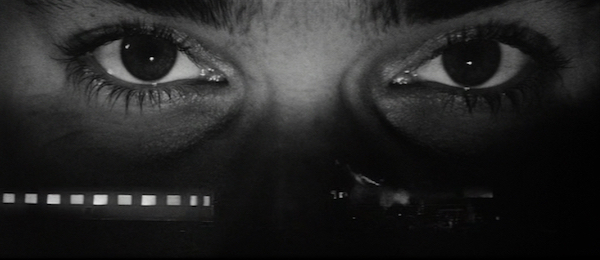
What is pretty arty though is the narration by Max von Sydow (an actor von Trier may have envied for being born with a “von” in his name and not having to add it), which is in English, and is presented as a hypnotist telling us to relax and imagine ourselves in 1945 Germany, counting down until we get there, or until months pass, or until we die, or whatever. My only guess for its meaning is that Leo’s life just doing his job and moving straight forward mostly ignoring what’s going on around him is like a hypnotic state. At any rate it works well since the shots of passing train tracks do seem hypnotic.
To me none of this comes off as pretentious, because right from the beginning there’s plenty of wry dialogue and matter-of-fact absurdity (like when his physical exam for the job consists of sitting naked on a hanging scale with nine people standing around him). There are many little moments that add up to alot, like his uncle talking about waking up and not knowing which direction the train is going – “what I thought was forward had suddenly become backwards.” It’s a joke because he doesn’t admit or doesn’t know that he drank too much and passed out, but also it’s representative about how he and his countrymen feel after the war.
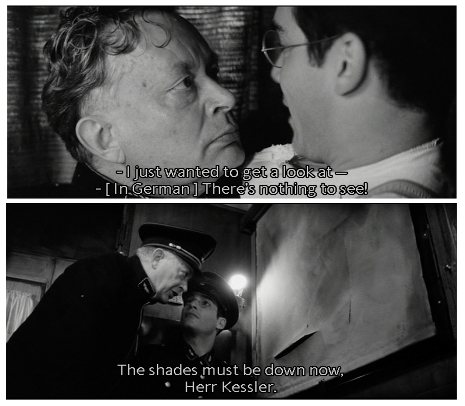 I like the motif of Leo’s uncle and others pulling down blinds in front of him or telling him not to look out windows. What he sees when he does look out is masses of poor people running along the train asking for food or money. There’s a scene where a passenger, an exiled Jew returning home now that the war is over, tries to get Leo to tell his terrified wife that their hometown “has been spared the havoc of war.” All he can tell him is, “What I’ve seen from the train looks bad.” But the man pretends not to hear him just like his uncle pretends not to see out the windows.
I like the motif of Leo’s uncle and others pulling down blinds in front of him or telling him not to look out windows. What he sees when he does look out is masses of poor people running along the train asking for food or money. There’s a scene where a passenger, an exiled Jew returning home now that the war is over, tries to get Leo to tell his terrified wife that their hometown “has been spared the havoc of war.” All he can tell him is, “What I’ve seen from the train looks bad.” But the man pretends not to hear him just like his uncle pretends not to see out the windows.
Larry, whose different perspective from the rest of his family comes partly from being gay, does not close the shades. There’s a surreal scene where he very casually shows Leo the misery everyone else has been trying to get him to ignore when he gets him to come from the sleeping car to the back.
“You are being led through the train,” the narrator says. “You are led through carriages you never knew existed.” It’s true – this is the first time we’ve seen the rest of the train, and it’s a SNOWPIERCER type journey through different levels of poverty, including skeletal shirtless men like concentration camp prisoners, some in cages. Remember that these guys are crammed back here when you get to the scene of a guy in first class flipping out because Leo didn’t polish his shoes properly.
The crucial event in the movie (SPOILER FOR 30 YEAR OLD INTERNATIONAL ART MOVIE) is when a Jewish man (director cameo) vouches for Max Hartmann, saying he gave him food and hid him in his cellar. It’s a total sham arranged by Colonel Harris to cover for Max’s past Nazi sympathies because he’s “important for the reconstruction of the transportation system.”
Ironically, immediately after this happens Kat reveals that her father’s house has a secret passage into an attic used not to shelter people, but to store a fancy-ass miniature train set (which gets wrecked when they have sex on top of it).
At the same time her father commits suicide, for reasons that are somewhat up to interpretation. Kat later explains it by saying that “it was not possible to repress the fact that Zentropa, during the war, transported Jews in cattle trains to concentration camps, and American officers first-class afterwards. In the end it was all too absurd.”
This is what I found very relevant about ZENTROPA: this idea of companies “not taking a side.” Just “staying out of politics” and doing their thing of making money. But of course by “not taking a side” against evil/oppression/fascism you are taking the side of evil/oppression/fascism. That first time he has dinner with the Hartmanns the Father says something related to this. In a conversation about praying during a war, Leo points out that both sides may be praying to God.
“God is on everyone’s side,” the Father says. “But when you fight for a cause with all your heart then God finds it easier to forgive if, in doing so, you disobey his commands.”
“Who does God not forgive?”
“Those who do not believe. Those who remain lukewarm, who don’t take sides.”
It works as both a thriller and a satire when the werewolves kidnap Kat to try to force Leo to bomb the train as it goes over a bridge, and the way he handles it is to… well, bomb the train as it goes over a bridge. The lukewarm motherfucker. It’s a whole sequence where he’s dealing with the kidnap/bomb situation while also handling a pain in the ass customer and undergoing an evaluation that will decide the future of his career. Like a particularly epic episode of some ‘80s sitcom. He plants the bomb and tries to warn his uncle but his uncle is chewing him out about how the test is going so he just figures fuck it and jumps off.
But then he thinks better of it, runs and catches up to the train (going slow over the bridge) and tries to get to the bomb. In my opinion it should be obvious not to give these Nazis an inch, but that’s the point of this character. He doesn’t have that sense. As many people didn’t. And still don’t. Anyway, just doing his job and staying out of things does not turn out well for him.
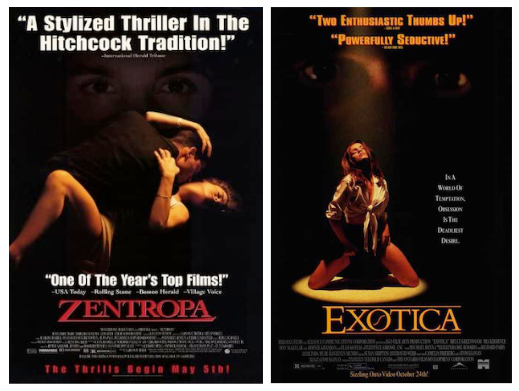
That’s what the movie’s about to me, but I don’t know what it’s about to von Trier. Remember when MELANCHOLIA played Cannes and he caused a kerfuffle at a press conference with a long rambling joke about how he thought he was a Jew but found out he was a Nazi and understands Hitler? (With poor Kirsten Dunst sitting next to him about to die of shame?) What he was talking about that day was that he was raised Jewish but a few years before making this movie he learned that his biological father was his mother’s employer. That he conflates being German with being a Nazi seems especially unfair since, at least according to Wikipedia, his father was part of an anti-Nazi resistance group during the German occupation of Denmark. Despite that, von Trier gave the man’s last name, Hartmann, to the Nazi-sympathizing family in the movie. Hmm. I’m honestly not sure what to make of that.
Three years after ZENTROPA, von Trier and Thomas Vinterberg founded the Dogme 95 movement, a set of rules designed to “purify” filmmaking by avoiding artifice in opposition to expensive studio films. It included things like not creating sets or props or using more than one light, not using non-diegetic music, only shooting handheld, not using any special effects or filters, also it can’t have any action or violence or be in a genre or take place in a time or place other than where it’s shot, it has to be in color and the director can’t be credited. Von Trier must’ve really wanted a change after ZENTROPA, a movie that breaks every single one of those rules, and not only credits the director but includes his name as part of the logo.
I really liked ZENTROPA/EUROPA, but I admit it’s possible Max von Sydow hypnotized me into believing I liked it. Many critics were hypnotized into writing positive reviews, and the Cannes Film Festival was hypnotized into awarding it the Best Artistic Contribution Jury Prize and Technical Grand Prize. The trance broke before they could give it the Palm D’or and that reportedly caused von Trier to storm out while flipping off the jury. Which is extra goofy because the winner was BARTON FINK, and can you imagine them getting upset about not winning an award? I hope they saw that and got a kick out of it.
It’s strange when a person is capable of creating a work of art like this but also acts like a big ol’ fuckin baby. In order to form a full and fair opinion of the incident, though, I knew I had to look up who specifically was a recipient of the von Trier finger. The Jury President that year was Roman Polanski, which is obviously a loaded one – a respected filmmaker more than worthy of the bird for other reasons. But you also have circa-THE-COMMITMENTS Alan Parker, you have the great cinematographer Vittorio Storaro (THE BIRD WITH THE CRYSTAL PLUMAGE, APOCALYPSE NOW, DICK TRACY), you have Whoopi Goldberg (THE PLAYER). And a couple other people, but the one I want to focus on is master of synth Vangelis (CHARIOTS OF FIRE, BLADE RUNNER). I’m sorry Lars von Trier, you born again Nazi or whatever – it is simply dishonorable to flip off Vangelis just because you’re mad that BARTON FINK is so good. That’s a fact.
ZENTROPA is good too though.
P.S. I’m fascinated with international co-productions, mostly of a cheesier variety than this one, but I was impressed that this is a story about German and American relations, shot mostly in Poland by a Danish director with French-American and American-born French actors playing the Americans, a Swedish actor playing the German uncle and a Danish actor playing the head of the German company. And it’s mostly in German but with some English, including the narration by a Swedish-French actor. Hey man, we all blend together, sometimes we’re in color, sometimes we’re in black and white.


























June 22nd, 2022 at 12:44 pm
It’s been an eternity (well, maybe something like 20+ years) since I saw it, but I remember it being one of the very few van Trier films that make it seem like the guy is actually a good film maker and not just one head-up-his-ass sitcom parody of an arthouse director. But I don’t remember any details about it.